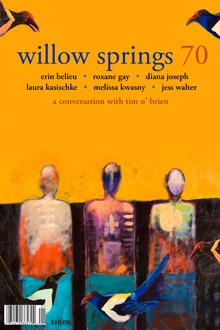
About Julialicia Case
Julialicia Case’s fiction and creative nonfiction have appeared or are forthcoming in such publications as Water-Stone Review, Confrontation, The Pinch, Descant, and Carolina Quarterly. Recently, she won the University of New Orleans Writing Contest for Study Abroad in the nonfiction category, and in 2006 she was awarded a Fulbright Fellowship to Germany. Currently, she’s at work on a collection of essays about growing up in West Germany in the 1980s, and a collection of linked stories exploring the emotional and logistical challenges of the Internet.
A Profile of the Author
Notes on “Growing Like Houses”
I wrote “Growing Like Houses” several years ago, after leaving Philadelphia and moving to attend graduate school in California. My sunny new world, with its bicycles and farmer’s markets, contrasted so drastically with the dilapidated row house and the gritty neighborhood where I taught in Philadelphia, that it was difficult to reconcile the two, or to understand my relationship to either.
The years immediately following college were fairly confusing for me. Like many graduates, I wasn’t sure what I wanted to do with my life. The transition from my studious women’s college to the co-ed real world was more baffling than I wanted to admit, and my parents, normally very helpful, were struggling with a crazy, unexpected divorce. 9/11 occurred during my very first week of teaching, and my most vivid memory is of the day afterwards, sitting in my classroom and helping a young woman with a third-grade reading level decipher a newspaper article about the tragedy. We spent an hour reading that article, and as she read, I remember considering my new role as an authority figure and worrying what would happen when we reached the end, what questions she would ask and how I would answer them.
When my friend Katie and I reminisce about these years, I think we’re both awed by how accommodating we were, how quick to accept the harsh and bewildering nature of our house and our professional environments as something normal and common, and to attribute our confusion to youthfulness and inexperience. Now that I’m older, feeling desensitized to confusion seems to be a defining element of adulthood, but part of the challenge of writing creative nonfiction is to acknowledge that uncertainty while at the same time making sense of it.
Notes on Reading
The works I like most tend to have a strong auditory element to them, a sense of rhythm and cadence that makes reading a bit like listening to music. Marilynne Robinson’s Housekeeping, Arundhati Roy’s The God of Small Things, and Carson McCullers’s The Heart is a Lonely Hunter are like this for me. I return to these books because the language won’t let me forget them. Recently, I re-read Jennifer Egan’s A Visit From the Goon Squad, because I wanted to listen more closely, to get a better sense of how its elements work together. Not surprisingly, I tend to feel best about my own work when I have a clear sense of its voice and rhythm, the sound that I would like it to make.
I’m not a picky reader, and I like to read several different kinds of things at once. Right now, for example, I’m reading Nabokov’s collected stories, Katherine Boo’s Behind the Beautiful Forevers, Melanie Thorne’s Hand Me Down, Joy Williams’s The Quick and the Dead, and George R. R. Martin’s Game of Thrones series. While reading, I hope most for surprise and honesty, a story that breaks from expected patterns and still seems uncontrived and completely authentic. I’ve fallen in love with a lot of recent essays and short stories for this very reason, and lately I’ve been wishing for a program (perhaps like iTunes) that would let readers purchase individual essays or stories and create personalized anthologies the way we create mp3 playlists. I would like, without bookmarks or photocopying, to be able to move from Peter Stenson’s honest, gritty essay, “Because Life Hasn’t Always Been This Good,” to Greg Hrbek’s beautifully surreal story, “Sagittarius,” to Melinda Moustakis’s unforgettable “The Mannequin in Soldotna,” to the driving, gripping beat of Susan Steinberg’s “Life.”


